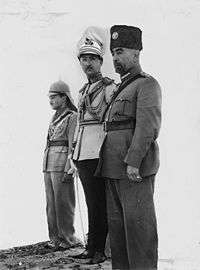1946 in Mandatory Palestine
| 1946 in Mandatory Palestine | |||||
|
»»» | ||||
| |||||
Events in the year 1946 in Mandatory Palestine.
Incumbents
- High Commissioner – Sir Alan Cunningham
- Emir of Transjordan – Abdullah I bin al-Hussein until 25 May (thereafter King of Transjordan)
- Prime Minister of Emirate of Transjordan - Ibrahim Hashem until 25 May (thereafter Kingdom of Transjordan)
Events

The last day of the British mandate in the Transjordan region in which emir Abdullah (on the right) was crowned as Transjordan's king, 25 May 1946.
King David Hotel bombing: The King David Hotel after the bombing
- January – The founding of the kibbutz Ami'ad.
- 25 February – Irgun and Lehi members blow up dozens of British military aircraft in airports at Lydda, Qastina and Sirkin.
- 22 March – The ruler of Transjordan, Emir Abdullah I, negotiated a new Anglo-Transjordanian treat, under which the Emirate of Transjordan (part of the British Mandate of Palestine) gained full independence and become the Hashemite Kingdom of Transjordan.
- 25 April - Members of the Stern Gang kill seven British soldiers guarding a military car park in Tel Aviv.[1]
- 30 April – The Anglo-American Committee of Inquiry recommended the immediate admission of 100,000 Jewish refugees from Europe into Palestine. It also recommended that Palestine remain a mandated territory, that facilities be put in place to ensure Jewish migration and that the 1940 Land Act which banned Jews from purchasing land in 95% of Palestine be rescinded.
- 25 May – The United Kingdom grants full sovereignty to Transjordan. The parliament of Transjordan proclaimed the ruler of Transjordan, emir Abdullah, as Transjordan's king and formally changed the name of the country from the Emirate of Transjordan to the Hashemite Kingdom of Transjordan. Three years later the country changes its name to Jordan.
- 16 June – Night of the bridges: Ten Palmach members blow up bridges across Palestine which link Palestine to the neighboring countries Lebanon, Syria, Transjordan and Egypt, in order to immobilize its transportation.
- 29 June – Operation Agatha
- 22 July – King David Hotel bombing: Irgun members detonate bombs in the basement of the King David Hotel in Jerusalem, where the British had brought a large amount of documents confiscated from the Jewish Agency. The attack kills 91 people and injures 45 more, mostly civilians. The hotel was a center of British administration at the time, although Arabs and Jews were also victims. The Jewish National Council condemns the attack.
- 6 October – The founding of the kibbutz Urim.
- 6 October – The founding of the kibbutz Be'eri.
- 6 October – The founding of the kibbutz Gal On.
- 6 October – The founding of the kibbutz Hatzerim.
- 6 October – The founding of the kibbutz Mishmar HaNegev.
- 6 October – The founding of the kibbutz Nirim.
- 6 October – The founding of the kibbutz Shoval.
- 23 October – The founding of the kibbutz Ein Tzurim.
- 30 October – The founding of the kibbutz Dovrat.
- 26 November – The founding of the kibbutz Yehiam.
- December - David Ben-Gurion appointed director of Jewish Agency security policy at the Zionist Congress in Basle.
Unknown dates
Notable births
- 26 February – Ephraim Sidon, Israeli author, playwright and satirist
- 12 March – Ya'acov Dorchin, Israeli sculptor and painter
- 24 April – Benjamin Rawitz-Castel, Israeli classical pianist (died 2006)
- 26 April – Michael Reisser, Israeli politician (died 1988)
- 1 September – Shalom Hanoch, Israeli singer
- 20 September – Dudu Topaz, Israeli TV personality, comedian, actor, screenwriter, playwright, author and radio and television host (died 2009)
- 8 October – Hanan Ashrawi, Palestinian Arab scholar, legislator and political activist
- 17 November – Nehemiah Tamari, Israeli major general (Aluf) and head of IDF Central Command (died 1994)
- 20 December – Uri Geller, Israeli paranormalist
- 24 December – Uri Barbash, Israeli film director
Notable deaths
- 22 July - Edward Sperling, Russian-born Zionist writer, humorist, and Mandate government official, killed in the King David Hotel bombing.
References
| Wikimedia Commons has media related to 1946 in the British Mandate of Palestine. |
- ↑ Sykes, Christopher (1965) Cross Roads to Israel: Palestine from Balfour to Bevin. New English Library Edition (pb) 1967. Page 308.
This article is issued from Wikipedia - version of the 2/7/2016. The text is available under the Creative Commons Attribution/Share Alike but additional terms may apply for the media files.
